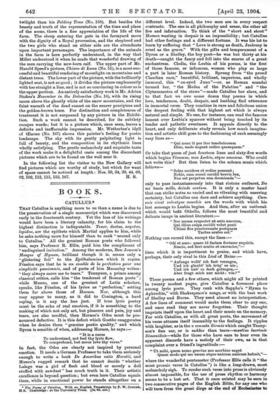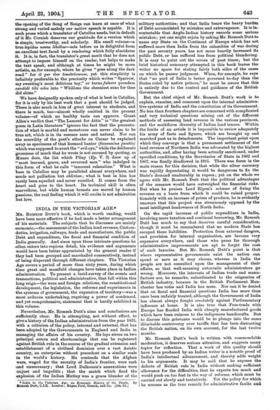"it is a curse
To understand, not feel thy lyric flow, To comprehend, but never love thy verse."
In fact, the Odes am clearly not inspired by personal emotion. It needs a German Professor to take them seriously enough to write a book De Amoribus antis Horatii, and Munro's ragged remark that he cannot decide " whether Lalage was a girl of flesh and blood or merely a doll stuffed with sawdust" has much truth in it. Their artistic excellence is beyond question ; but even here Catalina equals them, while in emotional power he stands altogether on a • The Pease of Cattalos. With an Engliah Translation by F. W. Cornish. H.A. Ctleihrldge: at the University Press. 175.-61 net] "Ut mihi, quern nemo gravius nee acerbius argot where the wonderful pentameter (Professor Ellis cads it "the most prosaic verse in Catalina ") is like a long-drawn, most melancholy sigh. To render such verse into prose is obviously almost impossible, for the use of prose rhythm or harmony seems to be a lost art. That it once existed may be seen in two consecutive pages of the English Bible, for any one who will tura from the great dirge at the end of Beeleeisetee to Tactus aratro est."
Quam mode qui me nnum atgne unicum amicum habuit,"—
the opening of the Song of Songs can learn at once of what strong and varied melody our native speech is capable. It is each prose which a translator of Catalina needs, but in default of it Mr. Cornish deserves our gratitude for a version which is simple, trustworthy, and scholarly. His small volume—a true tepid= norms libellus—seta before us in delightful form an excellent text faced by a rendering which fully elucidates it. It is, in fact, the translator's great merit that he does not attempt to impose himself on the reader, but helps to make the text speak, and although at times he might be more artistic, as, for example, where he gives "goes along the dark road" for it per iter tenebrieosum, yet this simplicity is infinitely preferable to the preciosity which writes " Sparrow, my sweeting's most delicious toy," or turns fulsere quondam, eandidi tillsoles into " Whilbme the sheeniest suns for thee did shine."
We have designedly spoken only of what is best in eatable, for it is only by his best work that a poet should be judged. There is also much in him of great interest to students, and there is much, too—almost wholly omitted in the present volume—of which no healthy taste can approve. Grant Allen's verdict that "The Lament for Attie is "the greatest poem in Latin literature" ignores the fact that the presenta- tion of what is morbid and monstrous can never claim to be true art, which is in its essence sane and natural. Nor can the scurrility of the poet's attacks on Caesar be explained away as specimens of that licensed banter (feseennina joeatio) which was supposed to avert the " evil eye," while the deliberate grossness of much that be wrote is not excused by quoting, as Munro does, the list which Pliny (Ep. V. 3) drew up of 'most learned, grave, and reverend men" who indulged in this form of what he calls "innocent relaxation," What is base in Catalina may be paralleled almost everywhere, and -needs not palliation but oblivion ; what is best in him has rarely been equalled and never excelled. It comes from the heart and goes to the heart. Its technical skill is often marvellous, but while human breasts are moved by human passions, the real feeling which it will excite is not admiration but love.
INDIA IN THE VICTORIAN AGE.* Romean Durr's book, which is worth reading, would have been more effective if he had made a better arrangement of his materials. The subjects that he discusses are mainly economic,—the assessment of the Indian land revenue, Custom- duties, irrigation, railways, trade and manufacture, the publics Debt and expenditure, the fiscal and financial condition of India generally. And since upon these intricate questions he often enters into copious detail, his evidence and arguments would have been better appreciated by the general reader if they had been grouped and marshalled consecutively, instead of being dispersed through different chapters. The Victorian Age covers a period of more than sixty years, during which time great and manifold changes have taken place in Indian administration. To present a lucid survey of the events and transactions, political and administrative, that fall within this long reign—the wars and foreign relations, the constitutional development, the legislation, the reforms and experiments in the systems of government, the expansion of territory—was a most arduous undertaking, requiring a power of condensed, and yet comprehensive, statement that is hardly exhibited in this volume.
But the chief object of Mr. Romesh Butt's work is to explain, examine, and comment upon the internal administra- tive systems of India and the constitution of its Government. No less than fourteen chapters are concerned with complicated and very technical questions arising out of the different methods of assessing land revenue in the various provinces, and the multiform diversity of Indian land tenure. Within the limits of an article it is impossible to review adequately his army of facts and figures, which are brought up and marched past us in detachments. The important point upon which they converge is that a permanent settlement of the land revenue of Northern India was advocated by the highest authorities, and, after having been actually sanctioned, under specified conditions, by the Secretaries of State in 1862 and 1867, was finally disallowed in 1885. There was force in the main reason for this decision, that while the silver currency was rapidly depreciating it would be dangerous to fix the State's demand unalterably in rupees ; yet on the whole we agree with Mr. Romesh That that the political advantages of the measure would have outweighed the financial risks. But when he praises Lord Ripon's scheme of fixing the revenue on a basis from which it could be raised propor- tionately with an increase of prices of produce, he is evidently unaware that this project was strenuously opposed by the moat intelligent landowners of North India.











































 Previous page
Previous page